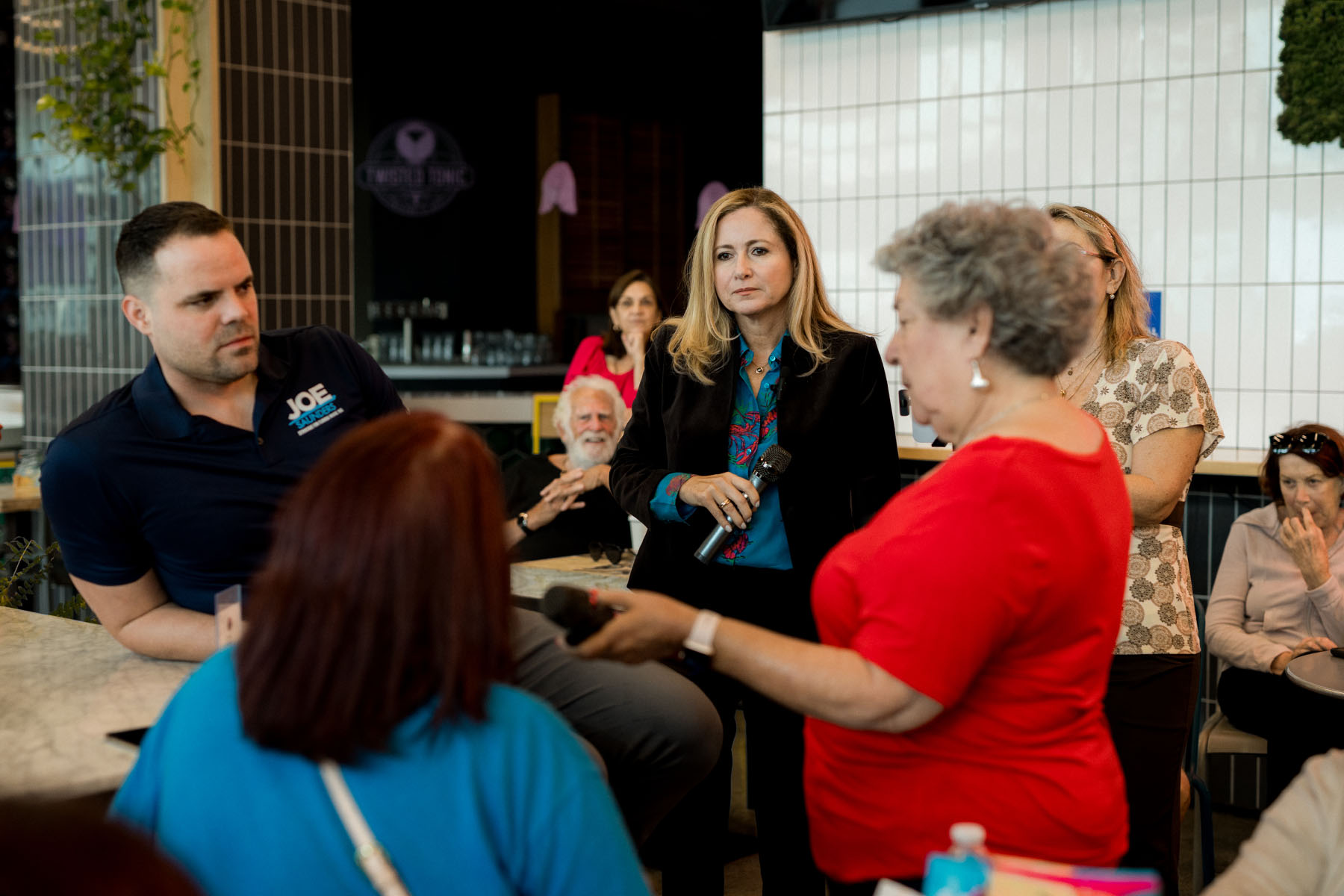HOMESTEAD and MIAMI BEACH, Florida — Debbie Mucarsel-Powell says her mother immigrated from Ecuador with young daughters in search of freedom and safety. The family was living on the heels of a military dictatorship, a period of instability and fear. Then and now, abortions remain largely banned in Ecuador, where an exception for cases of rape was instituted only in 2021.
Mucarsel-Powell is drawing on her own family’s own experience to reach voters in this state, home to a wide array of immigrants from Central and South America. The Democratic Senate candidate is urging voters to see Republican policies like the state’s new six-week abortion ban as undermining the freedom they sought in the United States.
Mucarsel-Powell has made reproductive rights a key focus of her campaign against Sen. Rick Scott, a powerful Republican who holds ambitions to lead the GOP in the Senate. Mucarsel-Powell is the first Latina to run statewide in Florida in a decade, and in a state where 1 in every 5 voters is Latinx, her success depends on her ability to stem GOP gains with that group here in South Florida.
Last month, Mucarsel-Powell held a meet-and-greet in Homestead, a more rural portion of Miami-Dade County where tree nurseries proudly fly flags from Latin American countries and where many voters swung for then-President Donald Trump in 2020. There, on a hot and humid afternoon, voters talked about abortion as an important but delicate issue for their circles of family and friends.
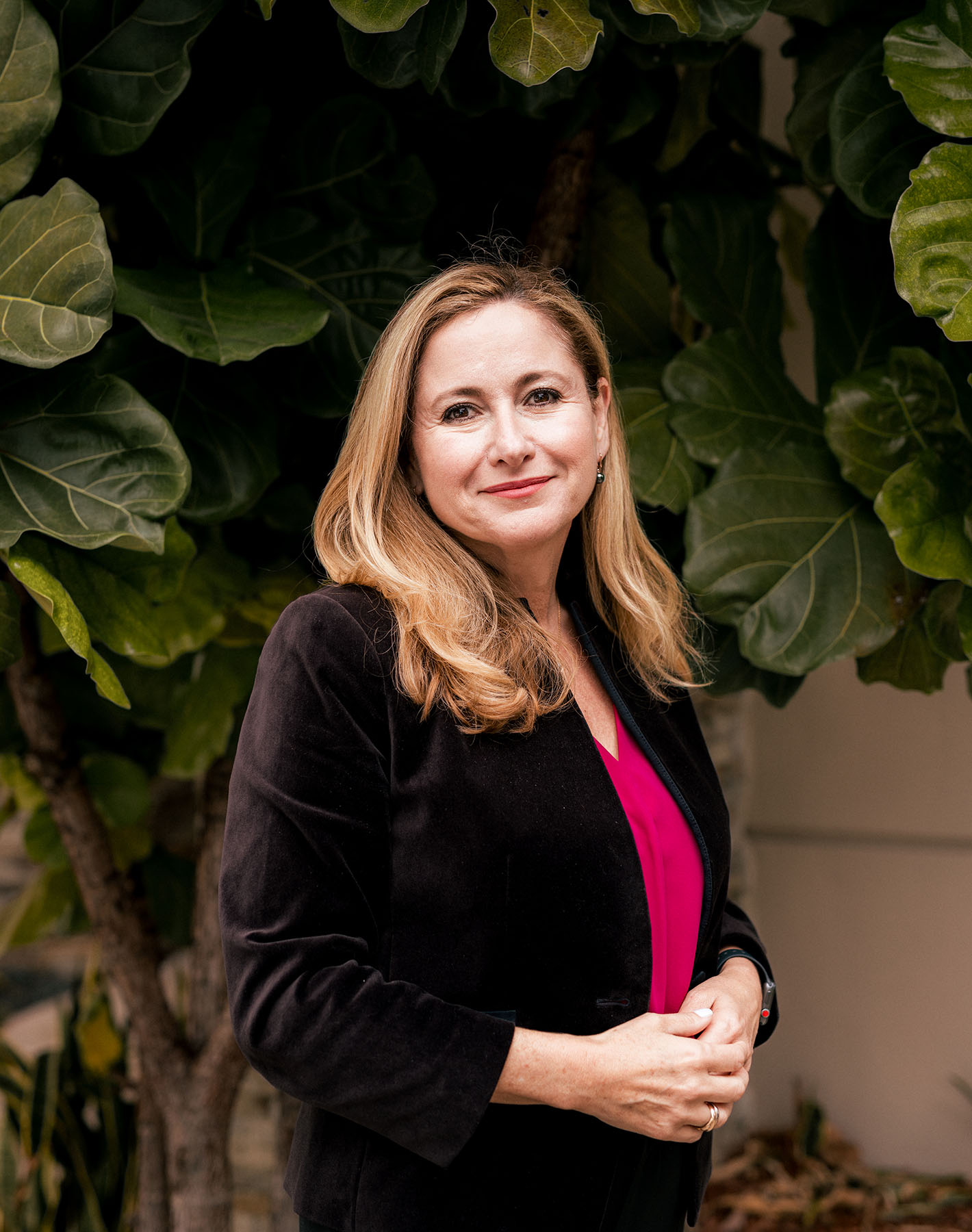
Roxanna Hernandez, 60, immigrated from the Dominican Republic, which has a total abortion ban with no exceptions. Hernandez said the restrictions and cultural stigma have created a hostile environment around the procedure, even in medical emergencies. In 2020, 16 percent of eligible voters in Florida were immigrants, a share that’s much higher in South Florida and will likely be higher ahead of the November elections.
“I really feel sad, I was telling my husband, that abortion has to be such an important thing for an election. It’s not like the government has to be involved in that,” said Hernandez, who came with her husband to meet Mucarsel-Powell at a colorful Mexican restaurant. The event’s backdrop was a large mural celebrating the Mexican uprising that led to independence from Spanish rule.
“This really is central to freedom, to the dignity of a woman, to democracy. I mean, it is such an important pillar of the freedoms we have here in this country,” Mucarsel-Powell said in an interview while waiting for voters to file in. For voters whose families fled unstable democracies or authoritarian regimes, Mucarsel-Powell said, abortion restrictions will signal an effort to increase government overreach into people’s personal decisions.
-
Read Next:
For voters connected to countries that have long had strong restrictions on abortion, she said, the long-term impact on women’s safety and economic opportunity is not new. “They know it’s directly linked to violence against women. It’s directly linked to high levels of maternal mortality,” she added. Latin America has some of the highest rates of gender-based violence in the world, and much higher rates of maternal mortality than the United States.
Mucarsel-Powell is countering Republicans’ own claims — promoted forcefully in 2020, when Republicans made big gains among Latinx voters in South Florida — that “socialist” Democrats pose a threat to American democracy. Scott, the wealthiest senator in the upper chamber, is tapping into that message again this cycle with a multimillion-dollar campaign targeting Latinx voters that includes four TV ads. All of the ads promote a threat of “socialism” and “communism” under Democrats and feature Scott speaking in at-times unintelligible Spanish.
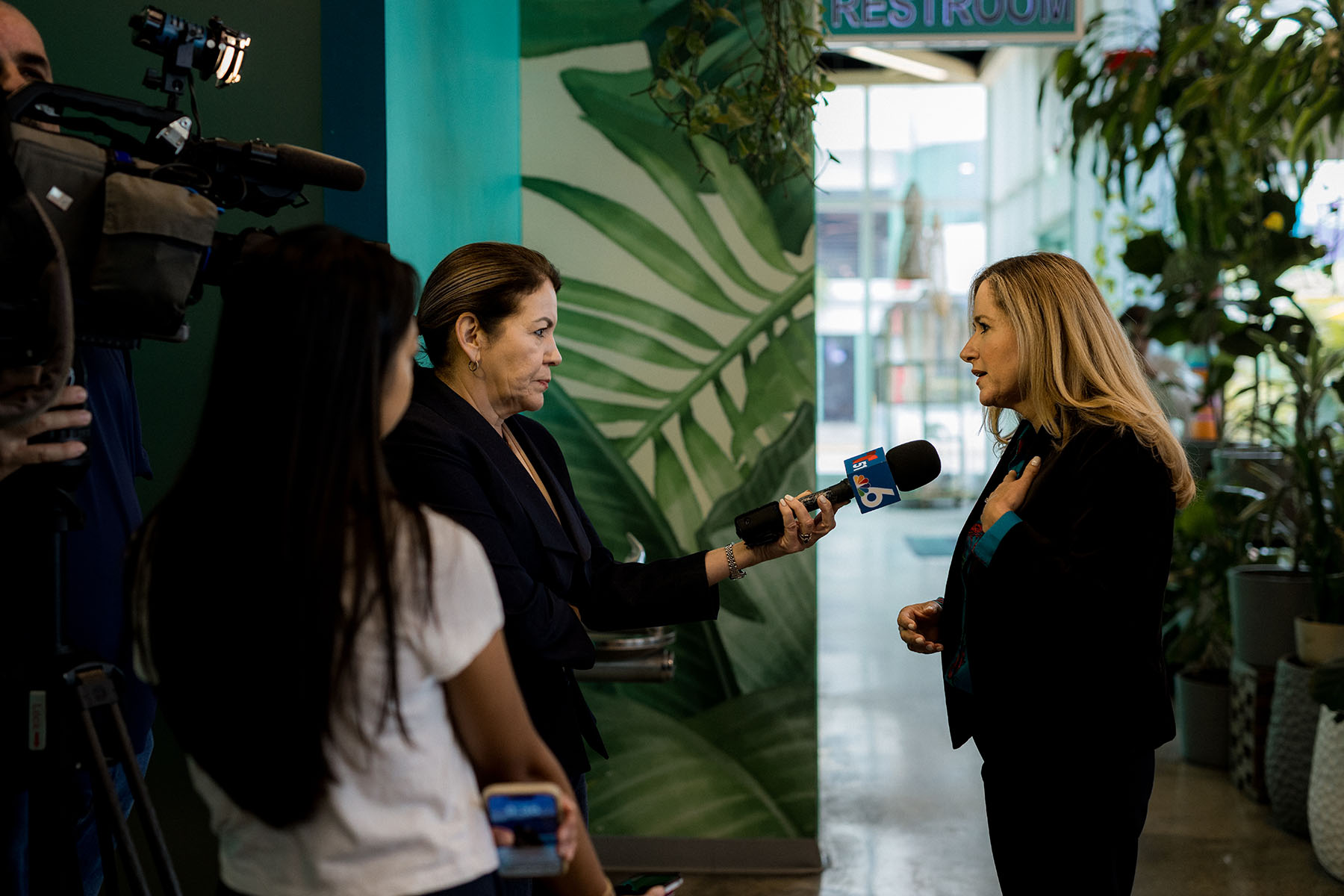
In one ad, Scott says that instead of learning math or English, school-aged children in the U.S. are learning from “socialist teachers” that “un hombre puede tener un bebé y convertirse en una mujer,” that a man can have a baby and become a woman. (Florida law bans teachers from discussing sexual orientation or gender identity in the classroom.) In two others, Scott visits a memorial to Cuban dissidents who died fighting or trying to flee the communist regime of Fidel Castro. Hispanic voters “like that someone cares about democracy,” Scott said in an interview with the Miami Herald. Scott’s campaign, reached through the National Republican Senatorial Committee, did not respond to a request for comment.
Mucarsel-Powell doesn’t disagree. But she’s betting that the state’s new six-week abortion ban, which blocks access to the procedure before many people know they are pregnant, will tap into voters’ fears of government overreach into personal decisions. It may all come as a shock to many voters, who are learning of the ban as it goes into effect. Florida is home to the third-largest Hispanic population in the country, and half of Latinas here are of childbearing age, compared with a third of White women.

We made it our business
…to represent women and LGBTQ+ people during this critical election year. Make it yours. Support to our nonprofit newsroom during our Spring Member Drive, and your gift will help fund the next six months of our politics and policy reporting. Can we count on you?
“This is going to be a top issue in November when a lot of people understand what this means,” she said.
Polling in the lead-up to May 1, when the six-week abortion ban went into effect, showed that 57 percent of Latinx voters in Florida believe the ban to be “too strict,” in line with voters overall, according to a survey of registered voters conducted in early April by Emerson College Polling and analyzed by the Miami Herald. But, when asked about a constitutional amendment on the ballot this November to enshrine abortion rights until fetal viability, around 24 weeks of pregnancy, just 39 percent said they planned to support it, compared with 25 percent who oppose it and 36 percent who remain undecided.
That’s compared with 42 percent of voters statewide who said they planned to back the measure, which needs 60 percent support to pass.
At Mucarsel-Powell’s meet-and-greet in blue-leaning Miami Beach, many voters said they planned to support the constitutional amendment, including one who said she felt more sure of her vote on the issue than her vote for president.
“Those sentiments go back to the times when I was born. Latinas have opened their minds,” said Judith Saenz, an immigrant from Ecuador.
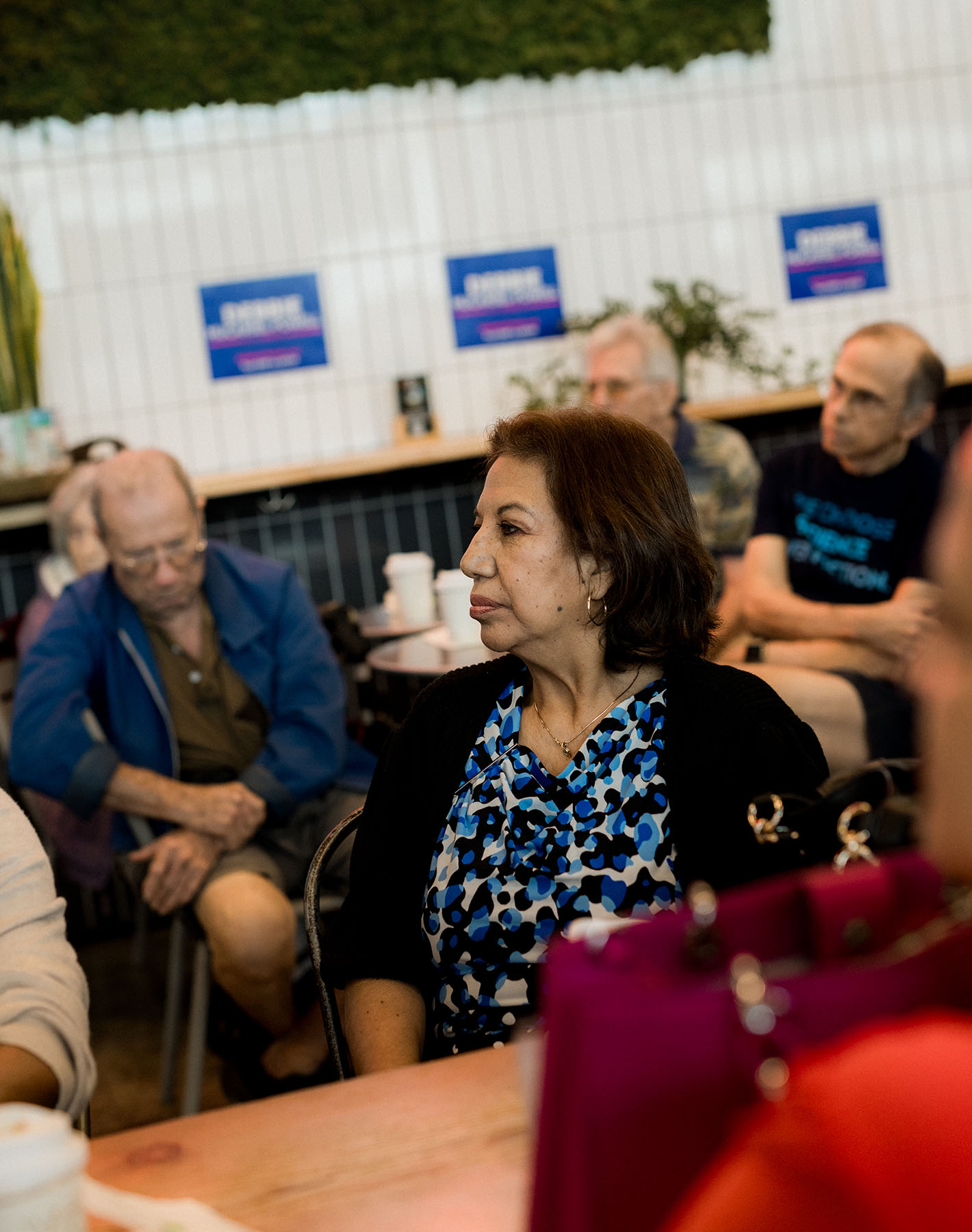
Another, Liliana Martinez, a resident of Miami Beach, said she grew up in Colombia with really conservative views on abortion.
“Mi abuelita, if I talked to her about abortion, she would kill me, disinherit me, everything” Martinez said. “But now things are different.” Martinez said having the ability to choose whether or not to have an abortion is “freedom of expression, liberty.”
She said that in Colombia, she watched women move forward with unplanned or risky pregnancies without any support or resources. Years later, she watched as her daughter chose an abortion for a wanted pregnancy amid grave risk to her health. “In my case, I was totally close to that. After I lived through that, as a Latina, a Hispanic, not a political partisan, I realized it’s a personal decision.”
Conventional wisdom about Latinx voters’ religious conservatism still impacts how some analysts think about these voters even as data shows that they have become mostly supportive of abortion rights. An April 2023 survey from the Pew Research Center found that 62 percent of Hispanic adults nationwide believe abortion should be legal in all or most cases. Even a majority of Hispanic Catholics, 61 percent, say abortion should be legal in all or most cases, a PRRI survey found. The number was lower for Hispanic Protestants at 44 percent, but even that rate was higher than the 27 percent of White Protestants, a key GOP base of support, who held the same opinions.
Chris Wills, the son of an immigrant from Venezuela, said he grew up in Miami attending Catholic schools and studied to become a priest before changing course. Wills, now a political consultant in South Florida, said during the Homestead meet-and-greet that politicians shouldn’t discount voters who are religious.
“For many Latinos, abortion is a decision between themselves, their family, their doctor and their priest,” Wills said to nods.
To make sense of how many religious Hispanic voters in Florida and the United States are supportive or may come to support abortion rights ballot measures and candidates, Paula Avila-Guillen, the executive director of the Women’s Equality Center, says it’s best to look to Latin America.
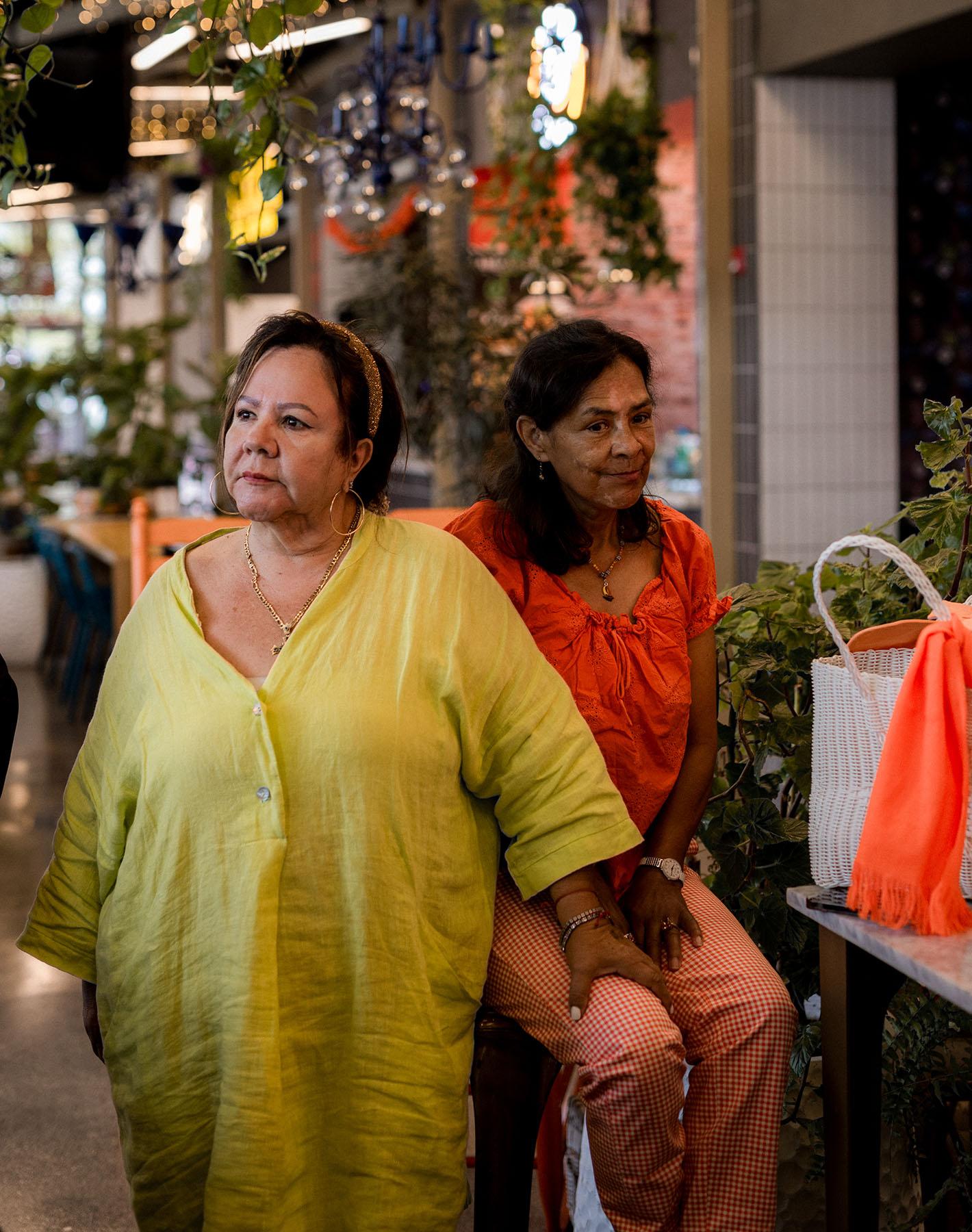
“All of the countries that have decriminalized abortion in Latin America in the last three years are very heavily Catholic countries. I mean, the pope is from Argentina,” said Avila-Guillen, whose group supports reproductive rights efforts in eight countries in Latin America. “For many people, there is no ambivalence between being a person of faith, but also being a person who supports abortion rights.”
Mexico and Colombia are also heavily religious countries where stories about the impact of abortion restrictions on teenage girls, on maternal health and on the disparate impact on lower-income women spurred support for abortion access. They decriminalized abortion in 2023 and 2022, respectively.
“We say in Spanish, las ricas abortan, las pobres se mueren. If you have means, you can get an abortion. If you don’t, you die,” Avila-Guillen said. Voters in Latin America came to understand it “as a privilege.”
-
Read Next:
Avila-Guillen, an immigrant from Colombia, said that Latinos are not “a whole package,” and that every voter’s immigration story, or their family’s immigration story, is different. But, she said, “the majority of us keep a connection with what is happening at home. Effective messaging taps into all the stories and all the knowledge that we have of the people that we know in our home countries.”
Unlike the constitutional amendment to protect abortion rights, Mucarsel-Powell only needs a plurality of the vote to win her race. As she campaigns forcefully for the amendment, she’s also making the case that her race is key to protecting reproductive rights at the national level amid a close presidential election and with control of the U.S. House and Senate in the balance.
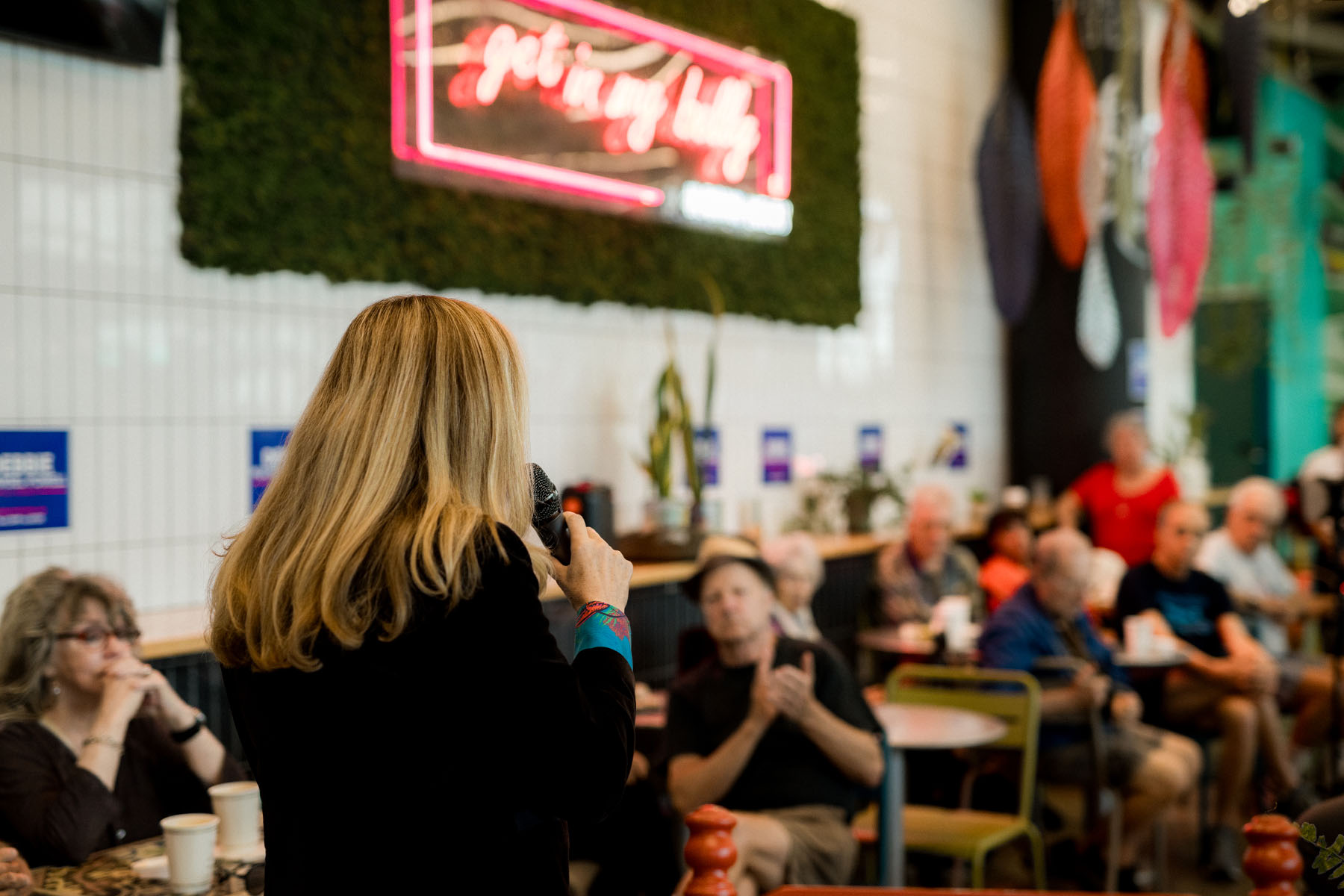
Scott has said he would sign a six-week abortion ban into law if he were governor again but also said recently he would support replacing the current state ban with a 15-week restriction. Scott previously supported a national ban, but a spokesman told Axios recently that he does not. He also will not support the state’s constitutional amendment on abortion, which will need some Republican backing to reach 60 percent support.
“It’s very divided. I would say it’s 50-50. In our family right now, I think there’s more people against abortion right now,” said Hernandez, the South Miami voter, as her husband, Hector Patino, looked on, with some skepticism. “Think about it,” she added.
“The flip side is that if that message gets sent correctly, that could change,” Patino said. “They could really understand what is at issue, especially for themselves and for their daughters.”
